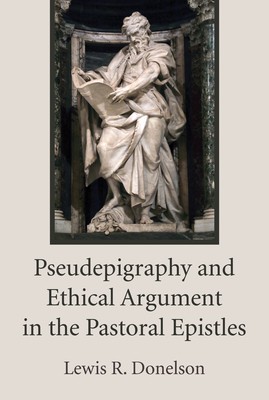
- We will send in 10–14 business days.
- Author: Lewis R Donelson
- Publisher: Wipf & Stock Publishers
- ISBN-10: 1498238203
- ISBN-13: 9781498238205
- Format: 15.5 x 22.9 x 1.3 cm, minkšti viršeliai
- Language: English
- SAVE -10% with code: EXTRA
Pseudepigraphy and Ethical Argument in the Pastoral Epistles (e-book) (used book) | bookbook.eu
Reviews
Description
By employing analyses of the literary structure of ancient pseudepigraphical letters and of the logical structure of ethical argument, this study discovers in the Pastoral Epistles a consistent theological ethic that has cosmological and cultic grounding. First, an investigation of Greco-Roman religious pseudepigraphical letters identifies those literary patterns that determine the form of argumentation in the Pastoral Epistles. Second, an investigation of the structure of ethical argument produces categories for organizing and analyzing the apparently disorganized arguments in these letters. Finally, this study concludes that the author of the Pastoral Epistles builds a coherent theological ethic by falsifying Pauline history and by grounding his ethical warrants in church officers. Dr. Lewis R. Donelson is Ruth A. Campbell Professor of New Testament at Austin Presbyterian Theological Seminary. His primary teaching interests include New Testament, Greek, Greco-Roman culture, and early Christian history.
EXTRA 10 % discount with code: EXTRA
The promotion ends in 23d.02:25:33
The discount code is valid when purchasing from 10 €. Discounts do not stack.
- Author: Lewis R Donelson
- Publisher: Wipf & Stock Publishers
- ISBN-10: 1498238203
- ISBN-13: 9781498238205
- Format: 15.5 x 22.9 x 1.3 cm, minkšti viršeliai
- Language: English English
By employing analyses of the literary structure of ancient pseudepigraphical letters and of the logical structure of ethical argument, this study discovers in the Pastoral Epistles a consistent theological ethic that has cosmological and cultic grounding. First, an investigation of Greco-Roman religious pseudepigraphical letters identifies those literary patterns that determine the form of argumentation in the Pastoral Epistles. Second, an investigation of the structure of ethical argument produces categories for organizing and analyzing the apparently disorganized arguments in these letters. Finally, this study concludes that the author of the Pastoral Epistles builds a coherent theological ethic by falsifying Pauline history and by grounding his ethical warrants in church officers. Dr. Lewis R. Donelson is Ruth A. Campbell Professor of New Testament at Austin Presbyterian Theological Seminary. His primary teaching interests include New Testament, Greek, Greco-Roman culture, and early Christian history.


Reviews